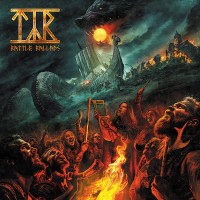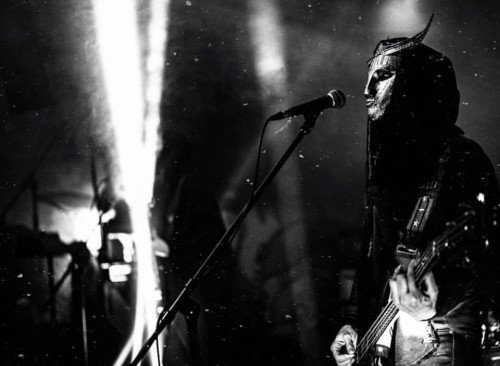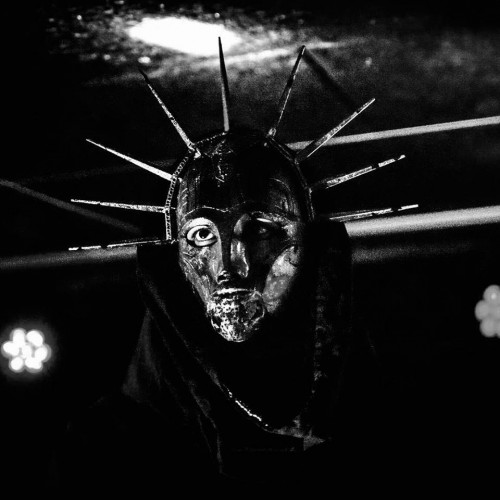Imperial Triumphant interview (05/2019)

| With: | Zachary Ezrin, Kenny Grohowski, Steve Blanco |
| Conducted by: | RaduP, Auntie Sahar (in person) |
| Published: | 30.05.2019 |
|
Band profile: |
Imperial Triumphant |
Our interview with Imperial Triumphant is both early and very late. First Apothecary tried interviewing them when they toured Florida and that didn't work out, so seeing them touring my city (just a week after seeing them close Roadburn Festival), I took the opportunity and delivered the questions (along with my own contributions) to them. But at the same time, I wanted to publish this interview right after the Roadburn article for the fourth day, but at this pace, it would've taken forever. So here we are, getting some insight on the band's deconstructionalist, jazzy and esoteric take on extreme metal.
Radu: Okay, I have started recording. Introduce yourselves first.
Steve: Steve Blanco. I play the bass.
Kenny: Kenny Grohowski. I play drums.
Zack: Zachary Ilya Ezrin, guitars and vocals.
Radu: Okay. Listening to Imperial Triumphant, it really seems as though there are many different possible genres that you enjoy and take influence from. What was the type of music you fell in love with first and what drew you to it?
Zack: First as a band, or??
Radu: As a person.
Zack: Rock'n'roll. Jimi Hendrix, Led Zeppelin.
Kenny: My family were in a pretty popular salsa band back in the '70s and '80s, so I guess I was exposed to that first, but they were musicians, so all kinds of music.
Steve: My earliest memory of music is The Rite Of Spring by [Igor] Stravinsky. My father had a lot of records and that shaped a lot of things, and then rock'n'roll.
Radu: Classical came before rock'n'roll.
Kenny: Yeah.
Radu: As layered as your compositions are and especially considering the jazz influence, it's a bit difficult to believe that the songwriting of Imperial Triumphant is planned out too far in advance. How mapped-out is your songwriting, exactly? Where is the line drawn between a pre-established concept and natural improvisation?
Zack: I think that there's nothing really, completely out of nowhere. If we're going to improvise, it's going to have a concept around it; it's going to have something to do with what we're doing. A lot of our songs are extremely written out, to the point where every note is accounted for on sheet music, and then some are, "Here's a concept. Let's rehearse it five times and go in the studio and see what happens", or just go in the studio and see what happens.
Kenny: That pretty much sums it up.
Steve: Yeah.
Kenny: The vast majority of the music we're playing is written out and what improvising you're hearing is happening in what we call "comping", which is essentially responding with musical ideas that are based off of what the other musicians are playing and based off the repertoire and the source material, which is the song, so most of what we're doing even when we're improvising is coming from either the song or reacting to maybe how he's playing the bass or how he's playing guitar that day or how I'm playing drums. The music is mostly composed; it's just how we go about it is where the improvisation actually takes place. They're not improv songs, with the exception of something like "Mother Machine" or "Luxury In Death", which are by nature improv songs. It's like, here's the cell of an idea or here's some chord changes and we're gonna improvise around the melody like you would in a jazz context.
Radu: When you began writing music, was there an initial decision to in a more experimental and deconstructionalist direction? Did you all intentionally position yourself at odds with extreme metal norms, or was it something that happened more naturally over time as a result of members' influences?
Zack: I think it's more natural. We aren't really typical metal musicians or listeners. We've always just longed for something loftier and greater than what's around us, so it's only natural that our music reflects this.
Steve: Our backgrounds as individuals are so varied that it's a natural process for all these different shapes and sounds and influences to be part of the sound that we make as a band.
Radu: I've noticed that your live performances are referred to on your social media as "golden rituals". What does the ritual entail, exactly, and is there something you feel you can accomplish on stage that can't really be touched upon on an album?
Zack: Oh, certainly. That's certainly true. The response from the audience has been in full agreement that our live performance is completely different from the album and the two are almost not comparable, and that's how it should be, because when you take in a live band, none of us feel that it should be exactly like the album. You want to feel the energy and the magic that went into the album recreated for you and the show that we build, that's the ritual. We want to bring the audience in -
Kenny: To feel the energy.
Zack: Yeah, share the energy and make this? The reason we're calling it this "golden ritual" is because it's not so much like a performance where you're watching us. We want it to be more a collective experience.
Kenny: All live music is? An album is recorded art. Once you've made it, it's done. It's never going to change. It's never going to be anything else. So with that idiom, you're going to explore sonic possibility, recording possibility. You're not really focused on a one-time experience. A live show is a chance for people to connect. It's a chance for the audience and the musicians to connect with one another as you would in any ritual, like if you go to church, or if you go to a movie or see a play, or go to watch someone speak at a public forum or in politics. Whatever it is, those are rituals. That's what you're engaging in, and you can't recreate that. You can document that experience, but it's like the old saying goes: unless you were there, you didn't really experience it, because the energy that he's talking about flows. The whole point of what we're doing on stage is to create a certain type of energy that takes the audience member outside of themselves and puts them in the energy with us, and that way the vortex moves and the energy moves, and we all build with it together. You can't do that with a record. A record is stationary. It is what it is. The goal of a record is to make something that, as a sonic experience, is the full totality of what we're aiming for, but a live show is about complete connection.
Steve: And to make a big fucking sound.
Kenny: And to make a big fucking sound that you can't experience if you have little earbuds or a crappy radio.
Steve: Yeah.
Kenny: Nothing is going to replace the sound of being in a room with the actual bass resonating in a hall and having that sound wash over you. Your home record is not going to do that for you. It's going to sound great, 'cause we did a good job mixing it -
Steve: *laughs*
Kenny: But being in a room with live instruments is like nothing else.
Radu: Was there much difficulty translating your album material to a live setting? From the opposite perspective, is there anything you feel you all can do on stage that can only be accomplished on album?
Kenny: As far as translating the stuff, not really, because a lot of the music was written and jammed and then toured with before we ever went into the studio, so -
Zack: And then performed live.
Steve: Recorded live.
Zack: Recorded live, rather. Sorry.
Kenny: Exactly. So when we went into the studio, we just treated it like a gig. We just hit the record button and played it like we played it on the show. Obviously in the studio you can add more layers, more elements, more sounds, more instruments, guests, so that's again where this "sonic art" comes in. That's where you're creating this sonic painting or tapestry. Translating a lot of the material is very natural. Some things, like "Swarming Opulence" and other stuff where there's a bunch of other instruments, that is a little bit trickier, but with technology we find ways to make it work to at least get the effect of what the album was.
Radu: Imperial Triumphant are notable for their visual aesthetic, particularly the unusual masks you all can be found wearing when performing live and in promotional pictures. Is there any specific significance behind them, some deeper symbolism involved?
Steve: Well, the masks are?
Radu: They look cool?
Steve: They look very cool, yes. Of course there's a style side to everything. We like to look cool. But they also represent our reflection of the New York City experience as being one of the control centers on planet Earth that has shifted through the different millennia. Let's say from Persia to Cairo to Rome to London to New York, that kind of thing. Those design movements and those stylistic elements that we have in the mask, they look a lot like - they're based on this art deco stuff, which is very New York City, we have a lot of art deco design in the city, but also back to ancient Egypt, which is really what that art deco movement really reflects. It's all connected to this bigger picture of what we're commenting on or observing.
Zack: Yeah.
Radu: So they weren't inspired by Eyes Wide Shut?
Steve: Of course.
Zack: Little bit.
Kenny: Um? I would say there's probably, like, Fritz Lang, you know, Metropolis - that sort of art deco technology style that you see a lot in that film, that's an inspiration. I would say probably the performance aspect is more where you get the Eyes Wide Shut thing -
Zack: Yeah, good call.
Kenny: Where it's, like, here's this ritual where everyone is gathered together and here are these hosts who are engaged in a certain courtship with the audience members.
Zack: Yeah, they're not very Venetian.
Kenny: Yeah, exactly. It's not a Venetian style. Art-wise, it's coming more out of the -
Radu: The Metropolis style?
Kenny: Yeah, Metropolis, sort of. I mean, even - Zack and I, we're both kind of gamers, so if you look at Skyrim, for example, Elder Scrolls, there's a bit of those kinds of masks you see in the dwarven armor. There is that, but it's -
Zack: I don't know what you're talking about. *laughs*
Kenny: Sure you don't. But if anyone wants to make that connection, they are similar, but, again, they are also borrowing from this art deco theme that we are playing with, because it's a major part of what you see a lot in New York City architecture.
Steve: The Stanley Kubrick connection is even deeper because his films are commenting on the huge picture of civilization, right? Every single one -
Radu: The human condition.
Steve: Yeah, every single one of his films is like that, so it's similar content, similar subject matter, so there'll be similar threads, things that align.
Radu: Okay. I wasn't sure if that film was set in New York. I think it was.
Steve: It is. Filmed in the UK, though, but...
Kenny: Which is another sort of -
Steve: Another thing, yeah.
Kenny: Gothic, you know?
Zack: Eyes Wide Shut?
Steve: Yeah.
Zack: 'Cause he didn't want to leave, right?
Kenny: Yeah, he only wanted to work in the sound stage in London.
Radu: Okay. From what I understand, you didn't always wear those masks. What fueled the transition into the new, more theatrical look?
Zack: Simple. Just wanted to create a live show that reflected the music more accurately than just your typical metal band -
Radu: Than just people playing.
Zack: Yeah.
Radu: And now it feels more like idols playing.
Zack: Yeah. It's a way more interesting, interactive live show.
Radu: Yeah. It leaves much more of a big impression.
Zack: Absolutely.
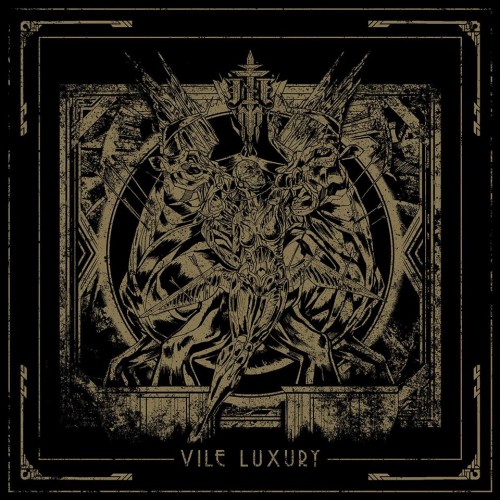
Vile Luxury
Radu: Vile Luxury has been getting a considerable degree of positive feedback in the metal world - honestly, more than I anticipated it would receive. Do you think this has something to do with people warming up to more experimental music, or are you simply capitalizing on the success of your earliest releases, or something else?
Zack: It's probably the former. People are just getting tired of listening to the same thing and we just happened to put out a record that is unlike anyone's ever heard, so of course there's gonna be a lot of thirsty ears.
Radu: I suppose a lot of people have been getting tired of the same old-school death metal that has been swarming 2018.
Zack: Old-school death metal, old-school black metal, it's all been done a thousand times by every country in the world.
Kenny: Also, I feel there's an honesty behind the music on this album. The three of us, we created music that we really?
Radu: Wanted to do.
Kenny: Wanted to create, exactly.
Steve: It's true.
Kenny: I wouldn't want to say that we're looking around and reacting to what music exists, "Oh, we want to make something different." I think we just naturally did this. Would you guys agree with me?
Steve: We're just being ourselves.
Kenny: Yeah. This is -
Zack: It's a really honest record. I think fans? Albums that blow up are usually? Fans can tell the authenticity, you know? And if it doesn't feel real, no one's gonna ever listen to it.
Radu: On Vile Luxury, you all went heavier on the droney dark ambient approach than ever before, especially on tracks like "Chernobyl Blues" and "The Filth". As a menacing drone fanboy, I really enjoy this new approach. Is it something you think you will explore down the line?
Zack: Who knows?
Kenny: Perhaps. As writers, not just musicians, we all are always just trying things and checking out new stuff, so -
Zack: Always open-minded.
Kenny: I'm sure there will be some similarities on the next record from what we did with Vile Luxury, just like there was when we did Inceste from Abyssal Gods; there was a little bit of overlap in how music was written or approached. A good sign of any band is that they're constantly reaching for things and digging deeper, figuring out, "Well, what the fuck am I into, what do I like, what do I dig, what am I hearing, what do I want to try this time?" For the three of us, we're just fortunate enough that a lot of times we nurture each other's curiosities as opposed to going, "No, man, you gotta do it like this." We don't really ever have moments like that ever in the writing process of this band, unless it's something that's either a little heavy-handed or corny, but as long as somebody's being honest with their idea or ideas, it's fair game. Already some of the ideas that we have for the next record are gonna be different than what we've done on Vile Luxury, different orchestration and what have you, approaches to songwriting that we haven't tried yet. It's just a matter of, like, there's not a lot of time to live, so you've got to try this shit at least once.
Steve: Yeah, exactly.
Radu: As grandiose as your music and your overall artistic concept is in general, it seems to be many potential factors that serve as an influence upon it. In that regard, what non-musical influences do you feel have played a key role in shaping that vision and direction of Imperial Triumphant? For example, Fritz Lang's Metropolis, which you have mentioned and which appears on your tour t-shirt.
Kenny: I'd say also just living in New York City.
Radu: I'd say that's the biggest one.
Kenny: It's a massive one.
Zack: Probably 90% of it.
Kenny: The three of us live fairly different lives in New York City, but we're all sharing the same city at the same time, so those influences, I think, also add to the pot of what we're doing as far as this sort of concoction that we're creating with this band.
Radu: So what is living in New York City like?
Kenny: Varies. We've all run around the city doing gigs, teaching kids, performing all different kinds of music, a lot of jazz, a lot of other kinds of stuff?
Steve: Big hustle.
Zack: Being in New York is like - yeah, it's a lot of pressure. Weights. You always feel like you gotta go, you gotta go, you gotta make that light, you gotta make that train, you gotta be here at this time and that means you gotta leave at this time. It's just this constant pressure and speed that drives you, pushing you and pushing you to go, go, go, and that leads to a lot of incredibly prolific art in the city.
Radu: Backtracking through your discography, it appears as though the themes of your material shifted from more historical and mythological themes of earlier records to the urban and moral decay of New York City angle that appears on Vile Luxury, but I could trace records of it as far back as the "Crushing The Idol" video. Do you think anything in particular prompted that shift?
Kenny: I think the personnel shift.
Zack: Yeah, true.
Kenny: The previous iteration of the band, which had Erik Malave and Alex Cohen - those guys, they're great musicians and they're good friends, but they are, I think, not as curious about some of the things that we're talking about on Vile Luxury as the three of us are. Just finding out in rehearsal rooms, in jamming, in just being on tour together that we had all these similar interests in film, in the history of New York City, interest in the mystery schools, interest in esotericism and other things sort of led in a small way, in an important way, to what Vile Luxury is now. It's just exploring these interests together and doing research and expanding upon that, saying, "How can we do this musically or theatrically? How we can embrace this and still be entertaining and not be heavy-handed and seem like we have some sort of agenda or message that we're trying to beat down into people?" We're just trying to make art.
Radu: Why was there no blood on the knife in the "Swarming Opulence" video?
Zack: I mean, we're shooting in, like? very, very expensive apartments, and maybe blood was not?
Kenny: *giggles*
Zack: ?on the top of everyone's mind when we were thinking about it? but that is a good question.
Kenny: *laughs*
Zack: I wasn't on set at the time of shooting that scene, so?
Steve: Maybe a little production slip.
Zack: Little production slip, perhaps.
Radu: You could've added it in post-production.
Zack: Oh, we tried. It looked terrible.
*Kenny and Radu laugh*
Kenny: When we get that Rammstein budget, it'll be there.
Steve: Yeah, don't worry.
Zack: Yeah, you'll get your blood!
Kenny: We'll get it in there somehow.
Radu: Also, is the energy that comes from the woman through the idol supposed to be a Twin Peaks reference?
Zack: The what?
Kenny: In where? In the video?
Radu: Right at the end. Some energy is coming from her.
Steve: I don't think that's a direct Twin Peaks reference, although there's a Twin Peaks fan in this band, but?
Radu: I wonder who that is.
Kenny: It's not directly related to Twin Peaks.
Steve: Not directly, yeah.
Kenny: But that is a film series and a director that we love.
Steve: Yes, we love David Lynch and that's a very cool interpretation, so that's great. [Dammit, Radu, are you ever going to interview somebody who DOESN'T love David Lynch?]
Radu: Yeah, it looked just like that part where Bob goes into the Black Lodge -
Kenny: Yeah.
Radu: Right, with Mike and the Hand -
Kenny: Yeah.
Radu: I'm not going to give any more spoilers.
Kenny: That's okay.
Steve: *laughs*
Radu: Actually, the whole video seemed very Lynch-ian. The whole deal of it.
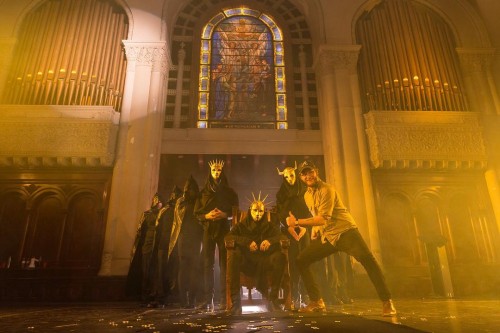
Steve: We get that sometimes. Somebody told us that our performance is kind of David Lynch-ian, especially the performance we just did at Roadburn, and then when I saw some clips of it I kind of agreed. I was like, "Oh, yeah, this is kind of Lynchian." But it's not on purpose necessarily. Just similar tastes.
Radu: Okay. There were many more guest appearances on Vile Luxury than usual for the band. Yoshiko Ohara [of Bloody Panda], Will [Smith] from Artificial Brain, horn players. Is this an approach that you see continuing for the band in the future, and, if so, what are some other artists you'd like to collaborate with?
Zack: Yes.
Radu: I've seen that you've had guest?
Zack: If we had to plan more guest artists? I don't know. Maybe more singers. I don't know, just different artists with different voices that maybe share the same vision and can provide a different color palette to our sound.
Kenny: There's some instrumentalists for some music that we've been writing - not in the studio together, necessarily, but some individual stuff people have been writing on their own where we're envisioning some different instrumentation. Some of it will be played by us, doing instruments we don't normally do on record, and then some other things where a few musicians that we're friends with and collaborate with in other projects are going to be doing some stuff for us potentially, so that's always on the table. Again, that's part of the whole sonic art thing. It's like, "Well, we need this sound on the record" - it's New York City. You can call that guy and get him in the studio and have it done. One of the great things about the city is that pretty much almost any instrument or style of music you can think of, you can find somebody who does it or knows somebody who does it and hire them to do it.
Radu: Yeah. You can easily get someone to play piano blindfolded at your party.
Kenny: Well -
Steve: That would probably be me.
Zack: Yeah.
Kenny: Yeah, that would probably just be him.
Steve: I'm the piano player, so.
Kenny: We've all had a pretty decent chunk of time just dedicated to a music career in New York City, so we've made a lot of connections with people in the metal scene, the local jazz and classical scenes, and otherwise, so finding an instrumentalist to do a role is not gonna be too much of a challenge.
Radu: It seems that jazz and metal have been getting a bit more intertwined lately. I've seen a lot of saxophonists performing on death metal albums and so on. How do you think this is shaping up in the near future?
Kenny: You're getting more guys now coming out of conservatories, whether it's jazz conservatories or classical conservatories, who have metal backgrounds, and unlike what it was in the '90s and, say, the early 2000s, when people generally didn't tell people that they listened to metal, because they didn't want to tarnish their reputation in their respective scenes of music, the younger generations don't really seem to care about that because the gig situation for them is crap, so they have no problem admitting that they're fans of Slayer and Meshuggah and whatever other bands. You're going to see more of that happening. It would be nice to see it done in a way where it's actually done professionally, because a lot of these metal bands are using -
Zack: Trite.
Kenny: Yeah, they're using the instrumentation -
Zack: Trite.
Kenny: Way out of context and not really taking advantage of the musician and the sound of the instrument -
Radu: Just adding a saxophone there to sound cool.
Steve: Like a gimmick, like a gimmick.
Radu: Like a gimmick, yeah.
Kenny: And they don't necessarily mean it to be that; it's just they don't have an understanding of those kind of musics. They're metalheads who want to add something to their thing, but eventually you're gonna just see metalheads who went to school for real and learned how to orchestrate a string quartet or a brass section. You're gonna see it more often. It's gonna just keep happening. Right, Zack, would you like to add?
Zack: Nah, just?
Kenny: Oh, just raising your hand?
Zack: *laughs*
Kenny: Yeah, I mean you are a prime example of that, you really are. He was a CalArts grad -
Zack: I had to learn how to do string quartets and brass quintets and -
Kenny: Composition major, yeah.
Steve: Yeah, exactly.
Kenny: He's a composition major. He learned how to orchestrate.
Steve: Next question.
Radu: Why don't you just go the Captain Beefheart route?
Zack: Great call.
Kenny: Wow. That would be great.
Radu: Okay.
Kenny: I don't know if we're that funny.
Radu: Do you have any artistic outlets other than music, and if not, have you considered getting into different mediums like painting, photography, and filmmaking?
Steve: I'm a filmmaker, so -
Radu: What did you do?
Steve: I already did that.
Zack: *laughs*
Steve: I've made 13 short films on everything from super 8 to super 16 film, HD, you name it. I've worked in productions, I've written full-length feature scripts?
Radu: That's cool.
Steve: Yeah. But music won, 'cause it's so cool. It's the coolest.
Radu: Yeah, I don't think filmmaking has taken you touring this far.
Steve: No, no.
Radu: For such dirt-cheap money?
Steve: Yeah, that's true.
Radu: I wonder how you're going to get out of this financial black hole.
Zack: What do you mean?
Steve: Yeah, which one? You mean this tour?
Radu: Not necessarily this tour. I mean this gig is dirt-cheap.
Steve: Oh, this particular gig? Well, I mean -
Zack: Well, it's Monday. We gotta play somewhere.
Radu: Ah, fair. Fair enough.
Kenny: Yeah, and they didn't want a day off.
Radu: I read in another interview that you all did recently that you have a background in jazz music, which isn't at all surprising given Imperial Triumphant's obvious flirtations with jazz influence. Is that something you ever think you will turn to in the future, perhaps as a new side band or something like that?
Kenny: We never left.
Steve: Yeah, there's no returning 'cause we still do it.
Kenny: Yeah. The vast majority of it -
Radu: Then how come I never heard of it?
Zack: 'Cause you don't come to New York, man.
Kenny: Yeah.
Zack: Come see us play.
Kenny: Yeah. Do you know who John Zorn is?
Radu: Yeah.
Kenny: All right. I work with him. That's, like, my boss. I'll be in Europe in June and July and August with him, so?
Radu: Can you get me an interview with him?
Kenny: Probably not.
Radu: Goddammit.
Zack: *laughs*
Kenny: You're not even gonna get him to interview at Rolling Stone or any major publication, so definitely you're not going to get a chance, trust me. And he's not the one to ask, for sure. And he has no qualms with me telling you no. But, I mean, Steve, all three of us constantly do jazz gigs all over New York City. The majority of the money I make as a musician is playing jazz.
Radu: Really!
Kenny: Yeah, this is my "new thing."
Radu: *laughs*
Steve: That's the thing, that's what we meant before about the jazz integrated into this band is completely natural. It's who we are.
Radu: You're jazz musicians playing metal.
Steve: No, we're all of the above -
Kenny: We're just musicians.
Steve: I grew up on metal, but I'm also a professional jazz piano player, so it's together, like Kenny was saying. Zack plays jazz gigs, too. We're all working [passing car drowns him out].
Radu: Yeah, I've seen a lot of people who have played both jazz and metal, like Colin Stetson. I think you know him? He's had a new metal project that released an album, like, two years ago.
Steve: Mhm.
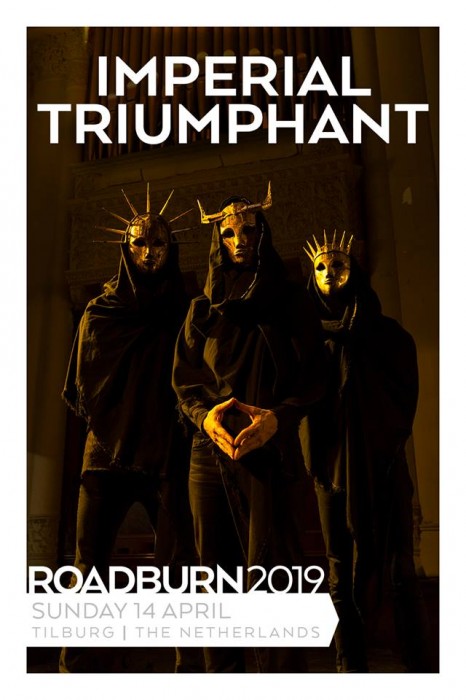
The poster for the band's performance at Roadburn
Radu: You've been the last band to perform at Roadburn's Patronaat venue. How did you feel about it?
Steve: Zack, why don't you answer that one?
Zack: That was an incredible honor, and it felt so cool to close the Patronaat as we did, and the reaction from the crowd, the reaction from the owner of the festival, it was all incredibly positive, so that's something we'll keep in our CV forever.
Radu: And was the encore planned?
Zack: No, we actually got off and we were talking to our manager and our publicist like, "Are we allowed to go back out?"
Radu: Yeah, because we kept shouting.
Zack: Yeah, yeah, yeah, and then finally we were like, "Ah, fuck, we'll go." It was actually planned to not do an encore.
Radu: We had already seen the background music coming by, somebody had already turned off the amps -
Steve: We totally didn't know -
Radu: We were like, "God fucking dammit!"
Steve: We didn't know you guys liked us so much.
Radu: Yeah, well? It was the last band!
Steve: Yeah.
Radu: We needed to postpone the post-festival depression as much as possible!
Steve: Right, of course.
Kenny: Yeah.
Radu: And that's what I'm doing right now. I'm postponing it even more.
Steve: Right.
Radu: Okay. There was something else I? You're signed to Throatruiner Records, right?
Zack: And Gilead Media.
Radu: Yeah. The question's about Throatruiner.
Zack: Okay.
Radu: You come from New York and you're signed to Throatruiner, both of which have a lot of hardcore influence. How come there's no hardcore in your music, no discernible hardcore influence in it?
Zack: Well, we didn't really pick the label because of their roster.
Kenny: Yeah.
Steve: The label was brought to us through Gilead, right?
Zack: Yeah, Throatruiner asked us to sign with them.
Radu: That's pretty cool.
Steve: And we're not a hardcore band.
Radu: *laughs*
Steve: We're just not a hardcore band.
Kenny: I've played in bands that did hardcore. It's not something where we - again, we don't consciously put jazz here, salsa here, mambo here. We don't do that when we write a song. That shit happens and it happens.
Zack: It just happens.
Kenny: But I would say, at least on a personal level, the way I'm playing drums, I'm not tipping, I'm not playing lightly, the beaters aren't an inch away from the - I'm hitting the drums. Maybe I don't play as hard as I used to when I was in bands that did hardcore, where you beat the shit out of the drums, but? The thing of hardcore is they may want to talk about respect and all that, but the reality is it's a music that's about "fuck you," and the way we all play our instruments is very "fuck you."
Zack: That's true.
Kenny: And that's the spirit of New York. The spirit of New York is "fuck you".
Zack: "Get out of my way."
Kenny: *slips into NY accent* "Get outta my way, you're in my way, go fuck yourself."
Zack: Yeah, yeah.
Kenny: And I think we all play our instruments that way. I don't really care how clean my blast is compared to the greatest blasters, 'cause I'm never gonna be that fast. [Zack]'s not really giving a shit how out of tune the guitar gets when he's bending the shit, nor is [Steve] really concerned about, like - I mean, I don't even know what's going on. It's just amazing.
Zack: *laughs*
Kenny: If you want hardcore, that's about as hardcore as you're gonna get, is just "fuck you, we're doing our own shit."
Zack: Yeah.
Steve: Yeah.
Kenny: And that's always been the case.
Radu: But can you mosh to it?
Kenny: We've had -
Zack: You can mosh in 11/8.
Steve: Oh, definitely. We get pits, we get pits.
Kenny: We've had some pits, yeah.
Radu: Okay. Wow.
Kenny: It's not common -
Zack: We get some pits - it depends on the crowd. You know, Chicago's a real angry fuckin' city, so, yeah, we get some pits there. *laughs*
Kenny: Chicago pits.
Radu: I bet it's better than guys sitting with their arms crossed, bobbing their head?
Kenny: Ah, we get that, too, you know -
Zack: Don't care, as long as people are enjoying it; doesn't matter.
Kenny: Yeah, people should interpret music however they gotta interpret music, however they connect, you know?
Radu: I interpret music sitting on my phone, scrolling Facebook.
Zack: Perfect.
Kenny: There you go, man. If that works for you, you know. *laughs*
Radu: That's all I'm gonna do.
Okay. Thanks for the interview. Are there any last words you'd like to send off with?
Zack: We're real excited to play here in Romania.
Kenny: Yeah.
Radu: You won't be for long.
Kenny: Well, I guess we're about to find out.
*everybody shares a warm, friendly laugh*
Zack: I gotta get the keys, man.
Radu: Okay, that's about it. Thank you very much.
Kenny & Steve: Cheers, man.
Once again, thanks to ScreamingSteelUS for transcribing the entire thing, to Apothecary for writing most of the questions, to the band for the opportunity and for two fantastic performances, and to you, reader, for taking the time to read this.
 | Posted on 30.05.2019 by Doesn't matter that much to me if you agree with me, as long as you checked the album out. |
Comments
Comments: 2
Visited by: 182 users
| Auntie Sahar Drone Empress Elite |
| Lord Slothrop |
Hits total: 5384 | This month: 30

